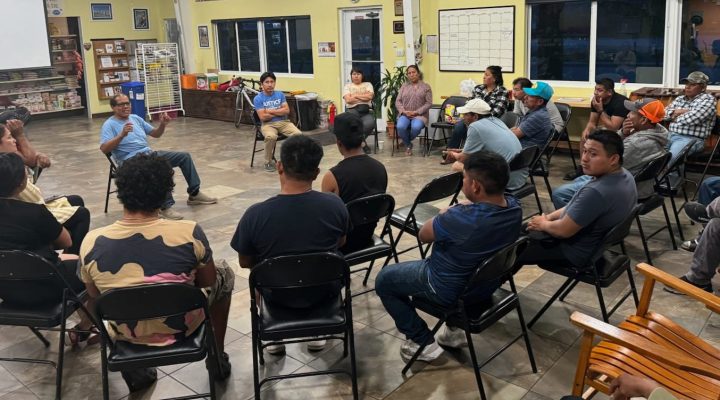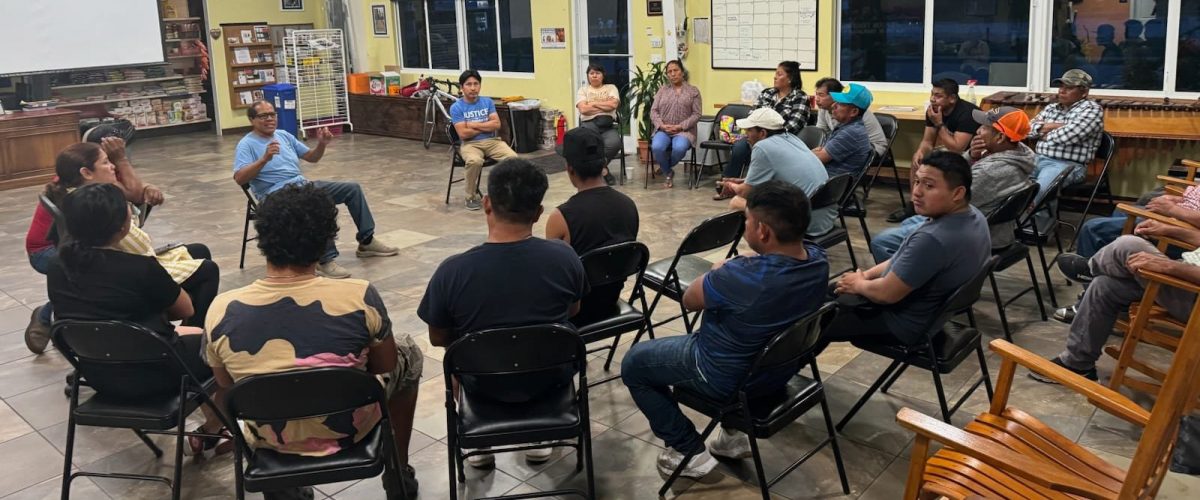Let me tell you about my church.
My church meets every Friday from noon until around 6:30 p.m. My church has no pews but plenty of folding tables and chairs as well as boxes and bins filled with groceries. My church is led by a Guatemalan-born preacher, Pastor Miguel, who starts the weekly time of service with announcements, introductions and prayer.
Each week, my church has several regulars and about 400 visitors. My church doesn’t usually offer Communion in the form of bread and wine. Instead, we provide those hundreds of visitors with two or three bags of groceries, including rice and beans and canned goods along with fresh, locally grown produce and donated bread.
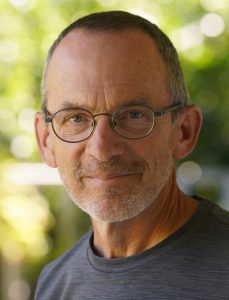
Rick Burnette
At my church, tongues are spoken, including Kreyol, Spanish, English and Mayan dialects. Visitors often come in worn-out work shoes and torn clothing covered with the green stain of tomato vines. Extremely hungry, tired and traumatized people aren’t expected to be cheerful at my church.
Misión Peniel isn’t officially a church. At least not yet. Although a farmworker ministry, it seems like a church to many. We are a faith community that gathers regularly to glorify God through interaction with Immokalee’s marginalized.
Ellen and I moved back to the States in 2013, after representing CBF Global Missions and another international nonprofit among Asian farming communities for 19 years. However, I wasn’t in my element at the nonprofit’s Florida headquarters.
One Sunday at church, we watched an interview featuring Sojourners’ Jim Wallis. I can’t recall his exact words, but Wallis stressed the essential spiritual practice of being in the presence of the poor.
He helped me understand why I wasn’t thriving. Despite working with an effective organization and being involved in a church, I was experiencing withdrawal from my previous interaction with those who struggle to access critical resources.
The church we attended was a partner of Misión Peniel, a farmworker ministry of the Peace River Presbytery — PC(USA) — in the town of Immokalee, Fla. Immokalee is where most of America’s wintertime tomatoes are grown on vast farms and harvested by migrant farmworkers. Ironically, the community is a food desert.
After a stint of volunteering at Misión Peniel, Ellen and I felt led to engage in full-time ministry to help address Immokalee’s food insecurity. This calling led to the establishment of our nonprofit, Cultivate Abundance.
In partnership with Misión Peniel and dozens of local gardeners, churches and small farms, we grow, collect and share nutritious food of cultural preference for Immokalee’s Haitian, Guatemalan and Mexican residents. Cultivate Abundance became a CBF Global Missions Engagement Partner after I was re-appointed as field personnel in 2018.
Our work was just hitting stride when COVID-19 emerged. With fewer volunteers, the Cultivate Abundance team began to assist Misión Peniel with Friday food distribution. Weekly efforts to pack and share hundreds of bags of food became our routine.
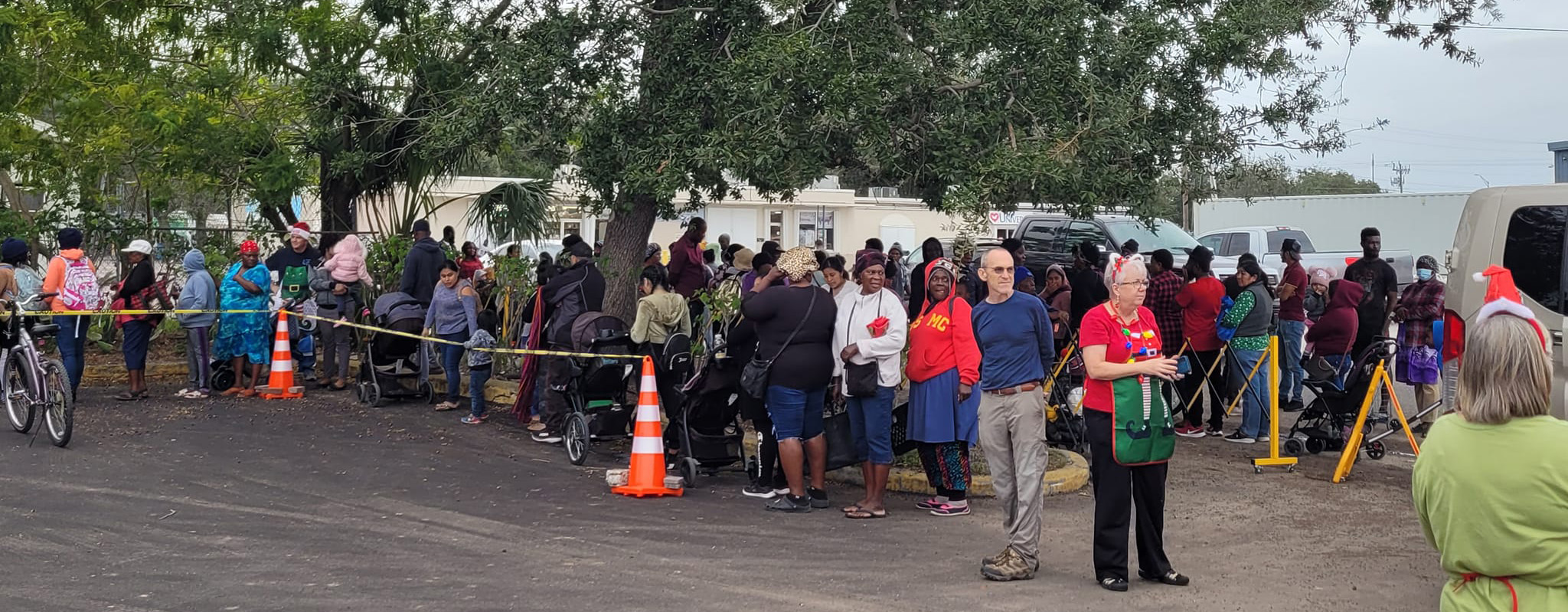
Rick Burnette (blue shirt) observes a line of people waiting to enter Misión Peniel.
Despite social distancing, we got to know the regular clients, including some who struggle with addictions, mental health challenges and other pain. Sadly, one of the pandemic casualties was our involvement with the church that introduced us to Misión Peniel.
For a while it was weird not to attend Sunday services. As the pandemic abated, we began to reengage with distant CBF churches in Florida and beyond. But we gradually realized church isn’t necessarily Sunday mornings among pews and stained glass. Through Misión Peniel, we are engaged in a less conventional version of church, a hybrid of sorts.
In the pandemic’s aftermath, amid a shifting ecclesiastical landscape, I think Misión Peniel represents one of many manifestations of the church.
I understand should anyone assert, “Misión Peniel is not a church. It’s a ministry established by churches, operating off the support of churches.” But what if the essence of church isn’t so dualistic? Perhaps the reality of church is more liminal and fuzzier than conventionally thought.
Not to limit discussion to nonprofits or ministries such as Misión Peniel, let’s also consider long established, conventional but struggling congregations in transitional communities where demographics, economy and culture are in flux.
“The adoption of neighborly, welcoming and collaborative approaches to address community issues could breathe new life and purpose into stalled, struggling congregations.”
Imagine churches with dwindling enrollments and budgets (or not), mustering the wherewithal to take inventory of local needs through purposeful conversations among members, neighbors and other community stakeholders. With such feedback, worshiping communities would be better positioned to project a witness for Christ through effective partnerships for positive change.
The adoption of neighborly, welcoming and collaborative approaches to address community issues could breathe new life and purpose into stalled, struggling congregations, especially if they embrace the presence of the vulnerable. Faith-based nonprofits also might consider accommodating local needs for worship and pastoral care.
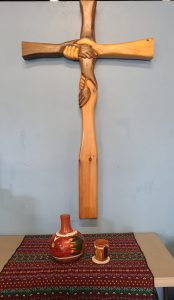
Communion table with cross at Misión Peniel.
I envision hybrid ministries, whether in church or nonprofit form, to be malleable, ecumenical and nimble, based on shifting local needs and the availability of resources. For example, Misión Peniel facilitates the collaborative use of space among compatible ministries to serve local youth. And whenever possible, worship opportunities also are provided.
Thank God for robust congregations with the means to address felt needs, both near and far. Many are well equipped to serve as allies and encouragers for hybrid ministries struggling to serve their challenged communities.
We must not forget that hybrid communities of worship and service aren’t new. The apostles had their hands full feeding the widows, and the Salvation Army has been at it for a long time as well.
Among Baptists, I’ve observed Grace and Main’s worshiping and serving presence among the unhoused of Danville, Va. I was inspired into action by the “farm with a church” ministry offered by Englewood Baptist on the outskirts of Kansas City. I also have participated in the ministry of Heritage Baptist in rural Heflin, Ala. These are just a few.
In obedience to the Great Commandment, while in solidarity with the marginalized, I’m sure more hybrid ministries will emerge across the landscape.
Rick and Ellen Burnette served as field personnel with the Cooperative Baptist Fellowship in northern Thailand from 1994 until 2009. They established the Upland Holistic Development Project, a ministry that continues to offer services related to agriculture and community development among hill tribe minority groups along the Thai-Myanmar border. In 2009, the Burnettes established and directed an international office for ECHO, a Florida-based international development agency, until their return to the U.S. in 2013 to work at ECHO’s Fort Myers headquarters. In 2017, the Burnettes established Cultivate Abundance, a nonprofit that addresses food insecurity among migrant farmworkers in Southwest Florida with Ellen serving as executive director. Rick was reappointed by CBF Global Missions as field personnel in 2018, continuing his role as the nonprofit’s program and technical director with Cultivate Abundance being recognized as a CBF Global Missions Engagement Partner.

